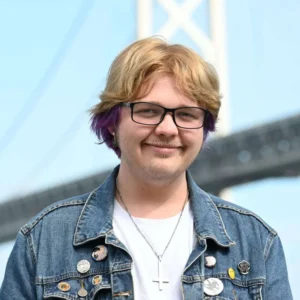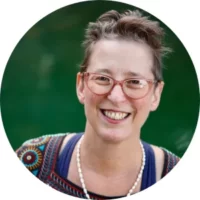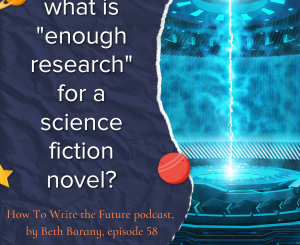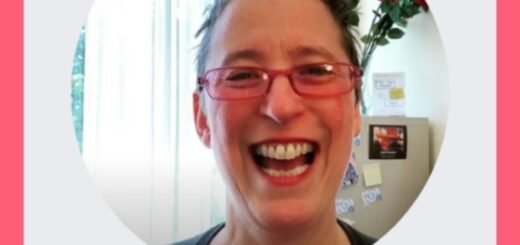Balancing World Building Elements for the Reader Experience with Jasper Ezekiel
Balancing World Building Elements for the Reader Experience with Jasper Ezekiel – How To Write the Future podcast, episode 149
***
“I’m always really fascinated by what gets trimmed off the edges. And because there’s gold in there sometimes. And why would a creative professional choose to include this, but not that?” – Jasper Ezekiel
In this How To Write the Future episode, host Beth Barany chats with speculative fiction writer Jasper Ezekiel, and talks about what parts of our story worlds we include in our fiction and what gets left out including balancing story elements for the reader experience.
Platforms The podcast is available on Apple Podcasts | Buzzsprout | Spotify | Podcast Addict | Amazon Music| YouTube
RESOURCES
GET HELP WITH YOUR WORLD BUILDING – START HERE
Free World Building Workbook for Fiction Writers: https://writersfunzone.com/blog/world-building-resources/
Sign up for the 30-minute Story Success Clinic with Beth Barany: https://writersfunzone.com/blog/story-success-clinic/
Get support for your fiction writing by a novelist and writing teacher and coach. Schedule an exploratory call here and see if Beth can support you today: https://writersfunzone.com/blog/discovery-call/
About the How To Write the Future podcast
The How To Write The Future podcast is for science fiction and fantasy writers who want to write positive futures and successfully bring those stories out into the marketplace. Hosted by Beth Barany, science fiction novelist and creativity coach for writers. We cover tips for fiction writers. This podcast is for readers too if you’re at all curious about the future of humanity.
This podcast is for you if you have questions like:
– How do I create a believable world for my science fiction story?
– How do I figure out what’s not working if my story feels flat?
– How do I make my story more interesting and alive?
This podcast is for readers too if you’re at all curious about the future of humanity.
About Jasper Ezekiel
Jasper Ezekiel is a queer author from the SF Bay Area. He’s a jack of all trades, writing poetry, non-fiction, fiction, and plays. He’s also a visual artist who specializes in illustration, a fiber artist with dreams of being a pattern creator, and a big ol’ goofball. His first book of poetry, Good, Clean Mania was published in 2023. You can find it on multiple platforms here: https://books2read.com/u/3Gp5gO
Social media links:
Instagram: https://www.instagram.com/s8nicangel/
My personal Substack: https://jasperezekiel.substack.com/
My writing Substack: https://jasperezekielk.substack.com/
Transcript for Balancing World Building Elements for the Reader Experience with Jasper Ezekiel
Hi everyone. Welcome to How To Write the Future. I’m your host, Beth Barany, and I have a special episode for you today. My episodes are primarily for science fiction and fantasy writers, so today you’re gonna listen in on a conversation that I have with speculative fiction writer Jasper Ezekiel, and talking about what parts of our story worlds do we include in our fiction and what gets left out.
Enjoy.
[00:26] Introduction to World Building Challenges
I actually have another kind of concept I want to throw at you that has to do with world building, which is: How much work do we do on things that may or may not be included?
So one of the things I’ve always really struggled with world building is finding what is relevant to the world and what is just not because when building a world, it’s really easy to just go out and out and build these like complicated spider webs basically.
How do you make the decision on what to choose to build for your world?
That’s a great question.
[01:04] Incorporating Feedback and Intuition in Writing
I have thoughts. I’m a very intuitive writer. So in my early drafts, I’m just putting in whatever occurs to me. When I’m editing and I have no answer to the question that critique partners and beta readers ask me, I write backstory. Then I come back into the manuscript and I try something.
I wrote some backstory. And then I ask that very same question: What is relevant to the story right now?
And then I make a guess and I put something in that feels right. Feelings, very intuitive. Then I put it in and then I send it back out to the beta readers and critique partners and see how they respond.
[01:43] Balancing Story Elements and Reader Engagement
And it is also like: What is going to move the story forward? So I can talk more about that and, if you have any specifics that you want to share or I can just use examples from my own writing. Because I can tell you, I have 50,000 words worth of backstory on a book that’s 150,000 words that isn’t in the book.
Yeah. That’s one of the things that’s always really fascinated me about the creative process is like deleted scenes in movies. I’ve been watching a lot of Will Ferrell movies, and in the end they always show the bloopers and when they’re riffing on jokes, how they do the joke over and over in different ways.
And so it’s here’s the versions of the joke that didn’t make it in the movie. I’m always really fascinated by what gets trimmed off the edges. And because there’s gold in there sometimes. And why would a creative professional choose to include this, but not that?
Is it their decision? Is it their audience’s decision? Is it in a movie’s case, the director or the producer’s decision? It’s really interesting to me.
Yeah, that is fascinating.
[02:46] The Editing Process and Reader Experience
I think we start to get into the real nitty gritty as someone who’s edited a ton of other people’s work as well as my own work, it’s again, I come back to this kinesthetic sense of is the energy going upward or is the energy like plunk?
Does it just stop, ’cause the reader experience, we want it to have this forward movement. And I even noticed it when as I start to give direction on editing my short film. I can feel oh, we’re moving, and then things stop. Oh, we’re moving things. So we don’t ever want a stop in our story.
We want it always to be feeling like things are moving forward, even in quiet moments, even when there’s no action or no dialogue. So that’s my barometer, personal barometer. And I also have readers here for X experience. Does what I have on the page match that experience?
So I’ve made a decision about what that X experience is, and it, again, it’s a feeling.
I’ll often say in the past, a compelling read. I’m like, wow. It’s always a compelling read, no matter the book. And in this book it’s often: How do I keep people engaged, moving forward and invested, emotionally caring? So anything that hinders that, stops that, interrupts that, gets cut.
Even if I’ve labored over it for hours and days and years. Cause at the end of the day, it’s this overall experience we’re creating.
[04:06] Finalizing the Manuscript and Testing
And then I test it. That’s what the beta readers are for, and the critique partners. And then I do another read, have people, hopefully strangers who haven’t yet read the book, also read the book toward the end before I publish to make sure everything is happy. Like the only critique they might have is, I am so angry at your villain. I’m like–
Yeah,That’s a good one to get. I would feel really pleased if somebody said that to me.
Or, oh, I was so rooting for her and, Ooh, I really love your secondary character. Can she have her own story?
And I’m like-
Yes.
Now they’re invested. Now there’s nothing about the craft. No spelling errors, no egregious typos stopping them and. Yeah. And I also am measuring that as I, in this stage with the beta readers, ’cause I’m in final phase now and I’m paying attention to what my beta readers go, oh, I think you need a glossary.
Or, I didn’t know what these Spanish words meant. And I’m like, okay, yeah I am presupposing people have some Spanish under their belt.
Yeah.
I need to deal with that somehow. And It’s a lot of testing. A lot of testing. Yeah. I know they do that with film. And I’ll be doing that with my film and with TV. They probably have a lot of experienced cooks in the kitchen helping with the same thing.
[05:15] Invitation and Closing
That’s it for this week everyone. If you have any questions or you would like to get your question answered live in an episode, be sure to check out our Story Success Clinic where you can sign up and we can have a conversation that we share with the world and you can get some live coaching.
So be sure to contact me through the podcast, how to write the future.com.
That’s it for this week, everyone. Write long and prosper.
Loved this episode? Leave us a review and rating here: https://www.buzzsprout.com/2012061
Need instructions on how to leave a review? Go here.
***
ABOUT BETH BARANY
Beth Barany teaches science fiction and fantasy novelists how to write, edit, and publish their books as a coach, teacher, consultant, and developmental editor. She’s an award-winning fantasy and science fiction novelist and runs the podcast, “How To Write The Future.”
Learn more about Beth Barany at these sites:
Author site / Coaching site / School of Fiction / Writer’s Fun Zone blog
CONNECT
Contact Beth: https://writersfunzone.com/blog/podcast/#tve-jump-185b4422580
Email: beth@bethbarany.com
LinkedIn:https://www.linkedin.com/in/bethbarany/
IG: https://www.instagram.com/bethbarany/
TT: https://www.tiktok.com/@bethbarany/
FB: https://www.facebook.com/bethbarany
X: https://twitter.com/BethBarany
CREDITS
- EDITED WITH DESCRIPT: https://www.descript.com?lmref=_w1WCA (Refer-a-Friend link)
- MUSIC CREDITS : Music from Uppbeat (free for Creators!): https://uppbeat.io/t/soundroll/fuzz-buzz License code: UMMKDRL02DFGKJ0L. “Fuzz buzz” by Soundroll. Commercial license: https://musicvine.com/track/soundroll/fuzz-buzz.
- DISTRIBUTED BY BUZZSPROUT: https://www.buzzsprout.com/?referrer_id=1994465 (Refer-a-Friend link)
- SHOW PRODUCTION BY Beth Barany
- SHOW CO-PRODUCTION + NOTES by Kerry-Ann McDade
C 2025 BETH BARANY
For more “How To Write the Future” episodes, go here.
If you’d like to invite Beth onto your podcast, drop her a note here.
✅ Like the work we do? Tip us! https://ko-fi.com/bethbarany







